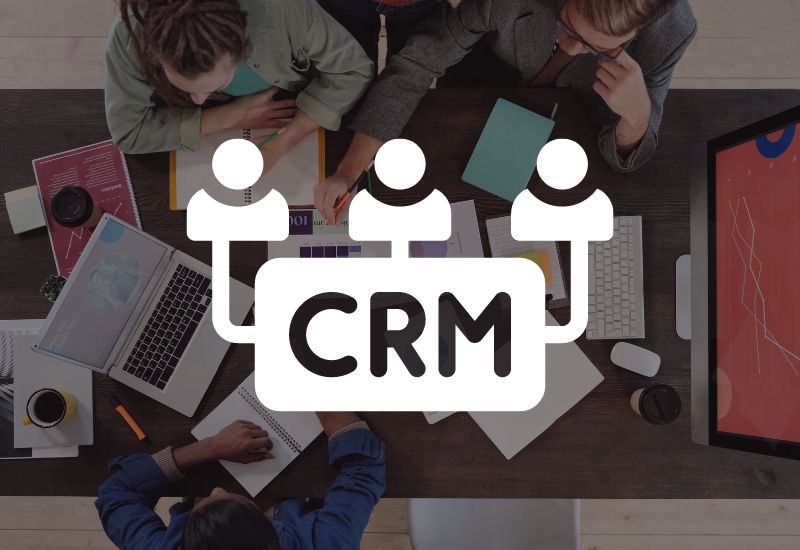Today’s companies face a dynamic market and demanding customers. To be successful, teams must be closely aligned and have the tools to work together seamlessly. This is where two key elements come into play: CRM (Customer Relationship Management) systems and internal communication tools. In this article, we will look at how CRM and internal communication tools can help create a more collaborative working environment while improving customer service and company performance.
What are CRM systems?
CRM systems (Customer Relationship Management) are software designed to manage and analyse companies’ interactions with their customers. The aim of these systems is to improve business relationships, increase customer loyalty and drive sales by better understanding customer needs and activity history. CRM integrates and automates various customer service, sales and marketing functions, creating a consistent view of each customer in one easily accessible place.
CRM systems are used by a variety of industries and can be tailored to the specific needs of small, medium and large businesses. As technology evolves, CRM systems are evolving to offer more and more functionality and integration with other tools, further increasing their value to organisations.
How does CRM support internal communication?
CRM software solutions can also be extremely useful in the context of internal team communication, even though their main purpose is customer relationship management. Integrating the CRM function with internal communication can significantly improve efficiency and collaboration between team members.
CRM systems can contribute to improving internal communication by:
- Centralisation of information – CRM allows all information to be collected in one place, providing easy access to client, project and task data for all authorised team members.
- Integration with other tools – Some CRM systems offer built-in communication tools such as chat, message boards, the ability to comment on tasks, and create notes, allowing for direct information exchange and discussions in the context of specific projects or clients. CRM integration with external communication platforms further facilitates ongoing communication.
- Increased transparency – The CRM system offers transparency into the activities of each team member. Managers can more easily monitor the performance and commitment of individual employees, allowing for more effective management and better alignment of support or training. This also enables a quick response to problems, as well as the exchange of feedback between team members.
- Process development and improvement – By collecting data on the performance of the team and the effectiveness of individual activities, the CRM system can help identify areas for improvement. Analysis of this data allows for continuous process improvement, resulting in better performance for the entire organisation.
- Support team mobility – Many modern CRM systems offer mobile solutions that allow data to be accessed and managed from anywhere and from any device. This is particularly important for remote or field-based teams, making them more flexible and responsive.
Internal communication tools
Internal communication tools are crucial for effective collaboration in teams, especially in large organisations or those that operate remotely. These tools help to maintain smooth communication, coordinate tasks and projects, and build organisational culture. Group and private chat rooms allow for quick problem solving and information sharing between employees.
Integrations with other tools
Integrating CRM systems with different tools and platforms is a key element in streamlining internal business processes. Integration allows tasks to be automated, information flows to be streamlined between different departments and overall organisational efficiency to be increased. CRM can be integrated with different types of tools.
Integration with email marketing software
By integrating the CRM with email marketing tools, it is possible to automate email campaigns based on the data collected in the CRM. It is possible to segment customers based on their behaviour or preferences, enabling the creation of more personalised and effective campaigns.
Integration with social media platforms
CRM systems can also be integrated with social media platforms such as Facebook, Twitter and LinkedIn. Such integrations allow social media activity, responses to posts and messages to be monitored, which can be used for more effective marketing communication and customer service.
Integration with ERP/WMS systems
Integrating CRM with ERP or WMS systems allows for better financial, logistics and operations management. Integration of these systems ensures data consistency between sales and other operational departments, resulting in greater transparency and operational efficiency.
Practical application of the CRM system
Here are some examples of real-life scenarios in teamwork where CRM could be particularly useful:
Sales team in a telecommunications company:
- Situation: The team is working to increase sales of internet packages. Each team member is responsible for different customer segments.
- Use of CRM: The CRM allows the details of each customer interaction to be recorded, which helps other team members to get a quick overview of the customer’s needs and history before the conversation. The team can also track which sales strategies are working best.
A marketing agency working on a campaign for a client:
- Situation: The team needs to coordinate multiple advertising activities and campaigns for multiple clients simultaneously.
- Use of CRM: The CRM system allows for campaign planning, publication deadlines and monitoring of customer responses to various activities. In addition, the team can analyse results and adjust strategies in real time.
IT company implementing software for a corporate client:
- Situation: The project team has to manage a complex system implementation project that includes both software development and integration with the client’s existing systems.
- Use of CRM: The CRM allows all project milestones to be recorded, so that each team member knows what has already been done and what still needs work. The CRM can also store information about the customer’s preferences and requirements, which is crucial when customising the solution.
Customer service department at an insurance company:
- Situation: Customers contact with various questions and problems that require a quick and efficient response.
- Use of CRM: The CRM helps document each case, ensuring that whichever team member responds will have access to the entire history of the customer interaction. This enables more personalised and effective assistance.
A property office managing lettings:
- Situation: The team needs to manage multiple properties and clients, coordinate visits, maintenance and leases.
- Use of CRM: A CRM system can help organise all these activities, ensuring that no query or task is missed. A CRM can also help to remind you of important dates, such as end of contracts or payment deadlines.
Each of these situations demonstrates how CRM can support teams in organising their work, improving communication and optimising processes, resulting in better service quality and greater customer satisfaction.
Implementing CRM in teamwork
Implementing a CRM system for teamwork is a key step for many organisations. Successful implementation of a CRM system can fundamentally change team dynamics, increase efficiency and improve customer service. However, it is a process that requires careful planning, team involvement and continuous improvement.
What steps and aspects should we consider when implementing a CRM system in a team? Here are some of them:
Analysis of needs and requirements
Before selecting and implementing a CRM, it is important to conduct a detailed analysis of the organisation’s needs and the team’s expectations. This includes:
- Understanding the business processes to be supported by CRM.
- Identifying the problems and limitations of the current approach to customer relationship management.
- Identifying the specific needs of different departments (sales, marketing, customer service).
Choosing the right CRM system
There are many CRM solutions available on the market, both general-purpose and specialised, tailored to specific industries. It is important to choose a system that:
- Best meets the identified needs.
- Offers integrations with existing tools and systems in the organisation.
Training and user involvement
A key aspect of a successful CRM implementation is the involvement of the end users, i.e. the team members:
- Organising training and workshops so that all users understand the functions and benefits of using the system.
- Providing technical support and support materials to ease the transition to the new system.
- Collecting feedback from users on a regular basis and adapting the system to their needs.
Integration and personalisation
To be most effective, a CRM system should be integrated with other tools used in the organisation:
- Integration with email systems, calendars, project management tools, etc.
- Customisation of the interface and functionality to suit the specific processes and preferences of the team.
- Automation of repetitive tasks to save time and increase productivity.
Monitoring and optimisation
Once a CRM system has been implemented, it is important to continuously monitor its effectiveness and impact on teamwork:
- Tracking key performance indicators such as response time to customer enquiries, number of closed sales, customer satisfaction.
- Regular reviews of the system and processes to identify opportunities for improvement.
- Adapting the system in response to changing business and technological conditions.
A culture of cooperation and openness
Implementing CRM is not only a technical issue, but also a cultural one. Promoting a culture of collaboration, openness to change and proactive knowledge sharing is as important as the technical aspects themselves.
Summary
In summary, a CRM system is a powerful tool that can help improve efficiency, communication and team collaboration. Whether in the context of customer relationship management or teamwork more broadly, CRM offers features that can revolutionise the way teams function and collaborate.


